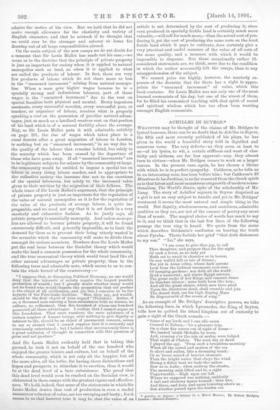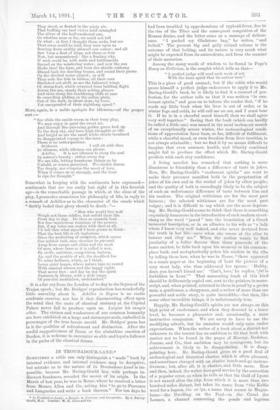ACHILLES IN SCYROS.* WHATEVER may be thought of the claims
of Mr. Bridges to lyrical honours, there can be no doubt that in Achilles in Scyros, the fifth and most recently published of his plays, he has given to the world a. beautiful story told in dignified and sonorous verse. The very defects—as they seem at least to us—of his lyrics, to wit, a certain stiffness and want of elas- ticity and airiness, are far less apparent—nay, they almost turn to virtues—when Mr. Bridges comes to work on a larger canvas. In the present case, again, he has chosen a theme with which he is in perfect sympathy. Calderon, as he tells us in an interesting note, has been before him ; but Calderon's El Monstruo doles Jardines, is as far removed from the Greek spirit as is that latest and most monstrous outgrowth of modern sensa- tionalism, The World's Desire, spite of the scholarship of Mr. Lang. The story of Achilles' sojourn in Scyros disguised as a girl is not an easy subject to handle, and yet in Mr. Bridges' treatment it seems the moat natural and simple thing in the world. But dignity, wholesomeness, and manliness, admirable qualities as they are, are not of the essence of poetry any more than of music. The magical choice of words has much to say to it, and we think that in the last few lines of the following passage the true ring is heard. We quote from the scene which describes Deidamia's confusion on hearing the truth about Pyrrha. Thetis forbids her grief "that doth dishonour to my son." " Lo," she says,
" I am come to give thee joy, to call
Thee daughter, and prepare thee for the sight Of such a lover, as no lady yet Hath sat to await in chamber or in bower, Or any walled hill or isle of Greece ; Nor yet in Asian cities, whose dark queens Look from the latticed casements over seas Of hanging gardens : nor doth all the world Hold a memorial; not where Egypt mirrors The great smile of her Kings and summit fames In timeless silence : none bath been like him ; And all the giant stones, which men have piled Upon the illustrious dead, shall crumble and join The desert dust, ere his high dirging Muse Be dispossessed of the crown of song."
As an example of Mr. Bridges' descriptive powers, we take the following lines, in which Lycomedes, the King of Scyros, tells how he quitted his island kingdom out of curiosity to gain a sight of the Greek armada :-
" Some of my lords and I one idle morn
Crossed to Eubcea,—'tie a pleasure trip,
On a clear day scarce out of.sight of home—
We landed 'neath tEchalia by noon, And, crossing o'er the isle on mules, were lodged That night at Chalcis. The next day at dawn I played the spy. 'Twas such a breathless morning When all the sound and motion of the sea Is short and sullen, like a dreaming beast Or as %were mixed of heavier elements Than the bright water, that obeys the wind. Hiring a fisher boat we bade the sailors Row us to Aulis ; when midway the straits, The morning mist lifted and lo, a sight Unpicturable.—High upon our left Where we supposed was nothing, suddenly A tall and shadowy figure loomed : then two, And three, and four, and more towering above us : But whether poised upon the leaden sea
" AahlZion in Soros: a Drama in a Mixed Molitor. By Hobart Bridges; London ; Edward Buinpar.
They stood, or floated in the misty air, That baffling our best vision held entangled The silver of the half-awakened sun, Or whether near or far, we could not tell Or what : at first I thought them rocks, but ere That error could be told, they were upon us Bearing down swiftly athwart our course; and all Saw 'twas a fleet of ships, not three or four Now, but unnumbered : like a floating city, If such could be, with walls and battlements Spread on the wondering water : and now the sun Broke thro' the haze, and from the shields outhung Blazed back his dazzling beams, and round their prows On the divided water played ; as still They rode the tide in silence, all their oars Stretched. out aloft, as are the balanced wings Of storm-fowl, which returned from battling flight Across the sea, steady their aching plumes And skim along the shuddering cliffs at ease So came they gliding on the sullen plain, Out of the dark, in silent state, by force Yet unexpended of their nightlong speed."
Hero, again, is a noble apologia for idleness,—of the proper sort "Soo while the maids warm in their busy play, We may enjoy in quiet the sweet air, And through the quivering golden green look up To the deep sky, and have high thoughts as idle And bright as are the small white clouds becalmed In disappointed voyage to the noon : There is no better.pastime.
Deidamia. I will sit with thee In idleness, while idleness can please.
Achilles. It is not idleness to steep the soul In nature's beauty : rather every day We are idle, letting beauteous things go by Unheld, or scarce perceived. We cannot dream Too deeply, nor o'erprize the mood of love, When it comes on us strongly, and the hour Is ripe for thought," Somewhat in keeping with the sentiments here expressed— sentiments that are too easily lost sight of in this feverish age—is the remarkable passage in which, at the close of the play, Lycomedes enunciates his philosophy of life, in reply to a remark of Achilles as to the character of the oracle which " darkly boded that glory should be death : "— " Men who would live well Weigh not these riddles, but unfold their life From day to day. Do thou as seemeth best Nor fear mysterious warnings of the powers. • But, if my voice can reckon with thee at all, I'll tell thee what myself I have grown to think : That the best life is oft inglorious. Since the perfecting of ourselves, which seems Our noblest task, may closelier be pursued Away from camps and cities and the mart Of men, where fame as it is called is won, By strife, ambition, competition, fashion, Ay, and the prattle of wit, the deadliest foe To sober holiness, which, as I think, Loves quiet homes, where nature laps us round With musical silence and the happy sights That never fret : and day by day the spirit Pastures in liberty, with a wide range Of peaceful meditation, undisturbed."
It is a far cry from the London of to-day to the Scyros of the Trojan epoch ; but Mr. Bridges' reproduction has wonderfully little unreality about it. Achilles in Soros is no exotic academic exercise, nor has it that disconcerting effect upon the mind that the casts of classical statuary at the Crystal Palace never fail to produce upon us. Largior his campis Alter. The virtues and weaknesses of our common humanity are here exhibited on a large and statuesque scale, embodied in personages of the true heroic mould. Mr. Bridges' poem has
in it the qualities of refreshment and distinction. After the sordid suggestiveness of Ibsen, or the absinthine emotion of Sardou, it is welcome to encounter so able and loyal a follower in the paths of the classical drama.



































 Previous page
Previous page